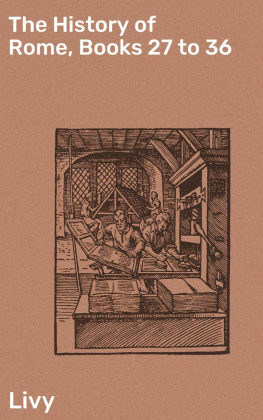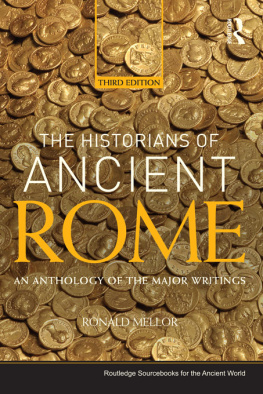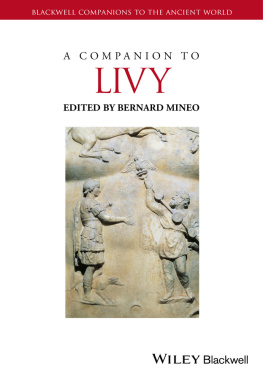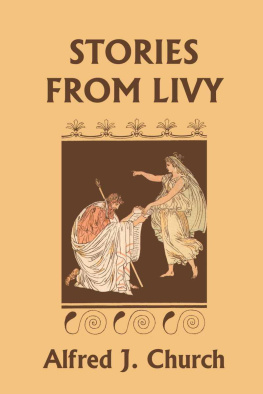
Livy History of Rome I
The following titles are available from Bloomsbury for the OCR specifications in Latin and Greek for examinations from June 2021 to June 2023
Catullus: A Selection of Poems, with introduction, commentary notes and vocabulary by John Godwin
CiceroPro Cluentio: A Selection, with introduction, commentary notes and vocabulary by Matthew Barr
LivyHistory of Rome I: A Selection, with introduction, commentary notes and vocabulary by John Storey
OvidHeroides: A Selection, with introduction, commentary notes and vocabulary by Christina Tsaknaki
TacitusAnnals IV: A Selection, with introduction, commentary notes and vocabulary by Robert Cromarty
VirgilAeneid XII: A Selection, with introduction, commentary notes and vocabulary by James Burbidge
OCR Anthology for Classical Greek AS and A Level, covering the prescribed texts by Aristophanes, Homer, Plato, Plutarch, Sophocles and Thucydides, with introduction, commentary notes and vocabulary by Simon Allcock, Sam Baddeley, John Claughton, Alastair Harden, Sarah Harden, Carl Hope and Jo Lashley
Supplementary resources for these volumes can be found at www.bloomsbury.com/OCR-editions-2021-2023
Please type the URL into your web browser and follow the instructions to access the Companion Website. If you experience any problems, please contact Bloomsbury at academicwebsite@bloomsbury.com
Contents
The teaching content of this resource is endorsed by OCR for use with specification A Level Latin (H443). In order to gain OCR endorsement, this resource has been reviewed against OCRs endorsement criteria.
This resource was designed using the most up to date information from the specification. Specifications are updated over time which means there may be contradictions between the resource and the specification, therefore please use the information on the latest specification and Sample Assessment Materials at all times when ensuring students are fully prepared for their assessments.
Any references to assessment and/or assessment preparation are the publishers interpretation of the specification requirements and are not endorsed by OCR. OCR recommends that teachers consider using a range of teaching and learning resources in preparing learners for assessment, based on their own professional judgement for their students needs. OCR has not paid for the production of this resource, nor does OCR receive any royalties from its sale. For more information about the endorsement process, please visit the OCR website, www.ocr.org.uk.
Preface
The text and notes found in this volume are designed to guide any student who has mastered Latin up to GCSE level and wishes to read a selection of Livys History of Rome in the original.
The edition is, however, particularly designed to support students who are reading Livys text in preparation for OCRs A-Level Latin examination in June 2022June 2023.
Livys monumental History of Rome, originally totalling 142 books, covered the period from the citys legendary foundation by Romulus to his own day the Principate of Augustus. Book I, from which the present selection is taken, covered the reigns of the seven kings of Rome concluding with that of Tarquinius Superbus and the foundation of Republican government that followed.
This edition contains a detailed introduction to the context of Livys History, supported by a family tree covering the last kings of Rome. The notes to the text itself aim to help students bridge the gap between GCSE and A-Level Latin, and focus therefore on the harder points of grammar and word order. At the end of the book is a full vocabulary list for all the words contained in the prescribed sections, with words in OCRs Defined Vocabulary List for AS Level Latin flagged by means of an asterisk.
I am grateful to Alice Wright and Helen Tredget at Bloomsbury for their guidance and support in the production of this edition, and to the two anonymous reviewers who offered immeasurably useful feedback on both the Introduction and the Commentary; needless to say, such errors as remain are my own.
John Storey
March 2019
Introduction
Livy
Little is known of the life of Titus Livius whom we call Livy even his dates of birth and death have been debated, although it is generally now believed that he lived from 59 BC to AD 17. He was born in Patavium (modern Padua), a town in Northern Italy which at that time belonged to the Province of Cisalpine Gaul, and it is possible that he returned there before his death, having spent most of his life in Rome.
Livys education seems primarily to have been in Patavium: unlike contemporary well-to-do young men, such as Horace, he was not sent by his parents to Athens, and there is evidence in his work both of a limited fluency in Greek, and a lack of geographical precision which may suggest that he was not widely travelled. Another contemporary, Asinius Pollio, is said to have criticized Livys writing for its Patavinitas his Patavianness which might imply a certain provinciality although whether this comment is primarily on his style or his politics is unclear: Patavium was a staunchly Republican, liberty-loving, city, while Pollio had sided with Caesar in the Civil War of 4945 BC . It is equally unclear whether Livys apparently restricted education was consequent on the turbulent politics of exactly that period when he might otherwise have been sent away, or on his family circumstances. Of the latter we know nothing.
Although a reference by Livy to Caesar Augustus (I.19.3) must postdate 27 BC when Octavian assumed the name Augustus, the traditional view that he wrote his history from that date onwards has more recently come under review. The consensus now is that Book I, as we have it, is a second edition, and that Livy began writing in the mid-30s BC by which time he was living in Rome. There is no record of his having been actively engaged in politics or the law-courts, nor evidence of literary patronage as enjoyed, for example, by Virgil or Horace. Livys reputation he had written a couple of minor philosophical dialogues which sadly have not survived gained him an acquaintance with Augustus himself, but they were not close. The Princeps is said to have disapproved of his treatment of recent history, and it seems that those books dealing with Augustus own reign were not published until after his death in AD 14. We must presume, therefore, that Livy came to Rome to access records that would enable him to write the magnum opus that he had conceived a history of Rome from its foundation to the present and that he was able to support himself in this enterprise.
Ab Urbe Condita
It is by this title, From the Foundation of the City, that Livys History is generally known. He dedicated his whole life to its composition, writing in total 142 books. Of these, regrettably, only 35 are extant, but for almost all others there exist summaries of varying length that enable us to appreciate the scope of the work. After a Preface on the task of writing history, Livy begins with the establishment of a settlement by the Trojan exile Aeneas, moving swiftly on to the birth and life of Romulus and Remus, and the foundation of Rome, traditionally dated to 753 BC . Book I from which the present selection is taken treats the Regal Period when Rome was ruled by a succession of seven kings, and the establishment of the Republic by Brutus in 510/509 BC .













